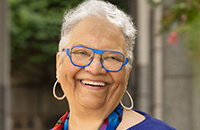
There is a human cost to military conflicts that cannot be measured in numbers but is reflected on the faces and in the minds of children. According to UNICEF, more than 400 million children live in countries where there is war or other violent conflicts. If they survive, many will find themselves with post-traumatic stress disorder. During times of war, children are especially vulnerable, and perpetrators of the violence are rarely held accountable for the killing, maiming, abductions, and armed recruitment of children.
Four-hundred million young lives are limited by the decisions of adults, and we have to ask ourselves: What is the impact to children who live in war zones? In 1991, a colleague, James Garberino, together with Kathleen Kostelny and Nancy Dubrow, published a book titled “No Place to Be a Child: Growing Up in a War Zone.”
While researchers and educators (including myself) had been focusing on child maltreatment in birth families and in out-of-home placements, we had not been examining the behaviors of children who had been in war zones and witnessed the violence of war.
Violence prevention begins at an early age and it is important we recognize underlying causes and manifestations of the behavior we see in these children.
Although we are not currently fighting a ground war in America, hate crimes in the U.S. are on the rise. In October 2023, the FBI released its Hate Crimes Statistics report for 2022. It compiles data from law enforcement agencies across the country and reports crimes in four categories:
Increase in Hate Crimes: The data reveals that hate crime incidents increased by 794 in 2022. (11,634 cases, compared with 10,840 in 2021.)
Race-Based Crimes: Hate crimes rooted in race, ethnicity or ancestry remain the most common. There were 6,557 reported incidents in 2022. Anti-Black or African American incidents—numbering 3,421— were more than three times higher than the next highest racial or ethnic category.
Religion-Based Crimes: There were 2,042 reported incidents based on religion. More than half of these (1,122) were driven by anti-Jewish bias. Incidents involving anti-Muslim (158) and anti-Sikh (181) sentiments remained at similar levels compared with 2021.
LGBTQIA+ Targeted Crimes: Incidents targeting gay men reached 1,075, while anti-lesbian incidents numbered 622. Both categories recorded their highest totals in the past five years and increased by more than 10% since 2021. A significant increase of nearly 40% was observed in reported anti-transgender incidents (totaling 338) compared with 2021.
Is peace possible in our turbulent world? When we reflect on the violence, it becomes evident that social workers cannot effect change without reaching out to colleagues in other disciplines and standing as a united force to stop the killing and the hate. If we believe in the dignity and worth of each person, we can stand together against terrorism, torture, bigotry, cruelty and violence, and we can be a voice for justice and peace.
I have heard from social workers with strong feelings and opinions about the need for more U.S. support for Ukraine; calling for the return of Israeli hostages; and putting a stop to the killing of Palestinian civilians. I doubt resolutions in these regions will be achieved soon, but social workers definitely can contribute to conversations and lead efforts that help more people and communities embrace peace. Then, perhaps, fewer children would be affected by war and other violence.
Tribute
I want to end this column with a tribute to a peacemaker—Tony Bibus, who we recently lost. Tony served as the director for Region IX on NASW’s national board. He was a gentle and quiet person, with incredible attention to detail.
He never talked about himself, but worked diligently on so many NASW activities, including, most recently, serving as chair of the Bylaws Committee and as a member of the board’s Executive and Strategic Planning committees. Tony’s accomplishments and contributions are too many to mention here, but I would like to list just a few to illustrate the extent of his impact on the social work profession.
He completed a PhD in social work from the University of Minnesota.
He served as chair of the Social Work Department of Augsberg College (now university).
He had numerous publications, including:
- “Supererogation in Social Work: Deciding Whether to go Beyond the Call of Duty.” Journal of Social Work Values and Ethics, 12(2), 27-40.
- “What Interesting Persons Social Workers Are!” Social Work Alumni Network Newsletter, Fall, pp. 10-11.
- “Applying Approaches From Moral Philosophy, Especially Virtue Ethics, When Facing Ethical Dilemmas in Social Work.” Journal of Czech and Slovak Social Work, 13(5), 33-50.
- Webstar’s dictionary defines peacemaker as “one who makes peace especially by reconciling parties at variance.” Tony Bibus filled this role every day. He moved mountains quietly and without fanfare.
Contact Yvonne Chase at president@socialworkers.org